How the Supreme Court ruling on nationwide injunctions impacts businesses and consumers
Friday’s decision limits the circumstances under which the court can issue nationwide injunctions — orders that stop a federal law or policy from being enforced while court battles play out.
!["The [Supreme] Court’s ruling just helps narrowly tailor injunctions for those who should be properly covered,” said Ondray Harris at the Competitive Enterprise Institute.](https://img.apmcdn.org/5040e14c791abccdf32dd412c27b6b5e72d33abb/widescreen/72b987-20250630-the-supreme-court-building-600.jpg)
Lawyers all over the country spent the weekend sorting out what the latest Supreme Court rulings will mean for the country and the economy. One of Friday’s decisions limits the circumstances under which courts can issue nationwide injunctions.
While the case was about the executive order related to birthright citizenship, there are consequences for businesses and other consumers, as well.
The Supreme Court didn’t outright ban lower courts from putting a nationwide stop on federal policies while the cases play out, but the majority argues class-action lawsuits are a better way to make that happen.
“If the class is big enough, they can still get a national injunction. But the Court’s ruling just helps narrowly tailor injunctions for those who should be properly covered,” said Ondray Harris, general counsel at the Competitive Enterprise Institute.
Before, let’s say there was a business rule or environmental regulation a bunch of people or businesses didn’t like. A group representing them could go to court and seek a nationwide injunction on their behalf.
“Groups such as the Sierra Club or the ACLU that have members across the entire nation say, ‘We as entities aren't being harmed by this legal provision, but our members are,’” said Michael T. Morley, a law professor at Florida State University. “And so we're suing to enforce our members’ rights. We have lots of members. They're spread across the entire country.”
But now, the Supreme Court wants lower courts to limit their rulings to the people actually involved in the case and to be careful about what constitutes a “class.”
So, moving forward, “we may see multiple injunctions applying only to named plaintiffs,” said Becca Brett, an associate at the law firm Clifford Chance. “Which could result in kind of a fragmented judicial environment, causing businesses to have to react in different ways depending on which jurisdiction they're in.”
Whereas in the past, a trade association could get a nationwide injunction by arguing that a bunch of businesses could be harmed by something. Now, it looks like individual businesses would have to get together in a class and really prove they would be harmed to argue for a broader hold on a policy.
“We're going to see a lot more class actions in the future on behalf of businesses, which may sound ironic because we always hear about businesses defending against plaintiff class actions,” said Anthony Sanders, director of the Center for Judicial Engagement with the Institute for Justice, a nonprofit public interest law firm. “That's not always practical, though; class actions add all kinds of costs to lawsuits.”
With all the extra costs and paperwork, Sanders expects what’s more likely to happen is that fewer people and companies will even bother challenging policies at all.













